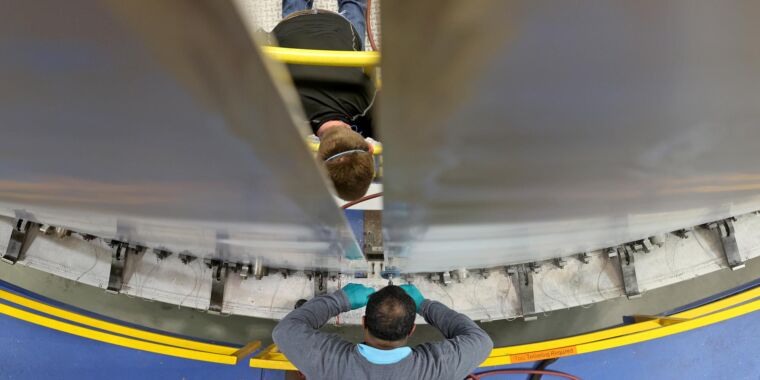This wouldn’t be a problem if we still had NASA doing the shuttle program, or some continuation of it, rather than outsourcing our spacecraft to the cutthroat lowest-bidder private sector. Is it really any surprise that SpaceX and Boeing are blowing up on the launchpads and having quality control issues when their sole objective is to make money? If we nationalized these initiatives again and cancelled the private contracts with these crooks, there would be no incentive for profiteering and corners would not get cut as often as they do now.
Sure, it would be a big cost to the taxpayer once again, but I think I’d rather have a reliable space program and like 2% less military budget to fund it, I think we’ll manage somehow without producing more tanks and planes that nobody is asking for.
There is a reason we moved this to the private sector. Govt bureaucrats can’t get out of their own way and every project triples in cost, with no single person calling the shots to get the job done. Govt cannot keep up with the pace we need.
Boeing is hot garbage.
SpaceX has a shit face, but they are incredibly competent and effective at iterating their way to space.
NASA in-house projects were historically expensive because they took the approach that they were building single-digit numbers of everything – very nearly every vehicle was bespoke, essentially – and because failure was a death sentence politically, they couldn’t blow things up and iterate quickly. Everything had to be studied and reviewed and re-reviewed and then non-destructively tested and retested and integration tested and dry rehearsed and wet rehearsed and debriefed and revised and retested and etc. ad infinitum. That’s arguably what you want in something like a billion dollar space telescope that you only need one of and has to work right the first time, but the lesson of SpaceX is that as long as you aren’t afraid of failure you can start cheap and cheerful, make mistakes, and learn more from those mistakes than you would from packing a dozen layers of bureaucracy into a QC program and have them all spitball hypothetical failure modes for months.
Boeing, ULA and the rest of the old space crew are so used to doing things the old way that they struggle culturally to make the adaptations needed to compete with SpaceX on price, and then in Boeing’s case the MBAs also decided that if they stopped doing all that pesky engineering analysis and QA/QC work they could spend all that labor cost on stock buybacks instead.
I agree with everything you say and I am all about the way that you captured the dysfunction of the political apparatus and its inability to deliver for a price and on a date. I think my argument is that that’s exactly why the government should not be in charge of this stuff. It should not be political. I don’t think there’s any way to avoid billboards in space, but at least we’ll be able to finally get out there.
The problem is that the private sector faces the same pressures about the appearance of failure. Imagine if Boeing adopted the SpaceX approach now and started blowing up Starliner prototypes on a monthly basis to see what they could learn. How badly would that play in the press? How quickly would their stock price tank? How long would the people responsible for that direction be able to hold on to their jobs before the board forced them out in favor of somebody who’d take them back to the conservative approach?
Heck, even SpaceX got suddenly cagey about their first stage return attempts failing the moment they started offering stakes to outside investors, whereas previously they’d celebrated those attempts that didn’t quite work. Look as well at how the press has reacted to Starship’s failures, even though the program has been making progress from launch to launch at a much greater pace than Falcon did initially. The fact of the matter is that SpaceX’s initial success-though-informative-failure approach only worked because it was bankrolled entirely by one weird dude with cubic dollars to burn and a personal willingness to accept those failures. That’s not the case for many others.
Is it really any surprise that SpaceX and Boeing are blowing up on the launchpads and having quality control issues when their sole objective is to make money?
I mean, spaceX has a fantastic track record. In their entire history, they only once failed to deliver a payload to orbit, and that was like just a month ago that they had their first failure after well over 300 successful launches. That’s record setting reliability in orbital rockets.
They blow up a lot of rockets in testing and development, but that’s kind of just how rocket development goes. It’s the same for NASA, Russia, and everyone else who designs rockets. You blow some up during development.
I’m just saying, I’m not sure you can lump SpaceX and Boeing together, they’re very different companies with very different track records.
NASA blew up a fair few rockets, and lost two shuttles, so that’s not necessarily the better option.
Fair point, I don’t want to fixate on that one aspect of the colossal technical challenge that is getting spacecraft into orbit, but I’m still of the opinion that a nationalized and fully government-funded space program will always yield better results than a privatized one because there is no profit-taking incentive.
Who do you think built the shuttle…?
Also, not defending the Musk shitstain, but focusing on “blowing up launch pads” tells me you probably know very little about the Space industry or development.
but focusing on “blowing up launch pads” tells me you probably know very little about the Space industry or development.
That wasn’t the focus of my post, but are you suggesting that there is a nonzero number of rocket explosions that would be considered acceptable?
I don’t need to be Elon Musk, or even know much about the space industry or development to know that the target number should always be zero.
but are you suggesting that there is a nonzero number of rocket explosions that would be considered acceptable?
…yes? During development specifically. Of course there is.
Let me know how that interview goes, because if the rocket you developed and spent billions of dollars building explodes at launch, you’re going to be looking for a new line of work.
I’m sure the next aeronautics company will totally understand. Mondays, am I right?
See, I’m not trying to be a jerk, but you keep showing more and more that you’re not following what’s happening in the launch business at all.
So for coming up on 10 years now, SpaceX has been absolutely kicking everyone’s ass. China is now coming up on being second.
They’re following processes of rapid iteration. During design, they build quickly (and relatively cheaply). They launch frequently. Those launches may not go perfectly. Sometimes they explode. But they get a LOT of data. This helps them iterate quickly.
This is different from what Boeing, Blue Origin, etc have been doing (and at different points, at NASA’s direction) - the “try to build it slow but steady, and perfect the first time” method. Guess what? That has been working horribly. It takes way way longer, costs way way more, etc. And they’ve left the door open for SpaceX to take over. They’re quickly becoming the ONLY game in town. And neither they nor, say, Blue Origin have really been focused that much on profit.
Rapid Iteration is also what we did early on in the space program. A lot of stuff failed (blew up) but we were making REALLY rapid progress.
Now - once the rockets go into production, they absolutely CAN’T blow up. ESPECIALLY with people inside. That’s a totally different thing.
SpaceX just lost had their first operation failure in like a decade. After hundreds of successful launches. It’s the best record I believe any rocket series has ever had.
You also picked tbe Shuttle as an example of things working well. It’s ironic - that’s specifically when everything started turning to shit - massive cost overruns, massive, years-long project delays. The delays for manned spaceflight, for launch systems, were a brand new thing starting with STS.
Blowing shit up is absolutely a valid part of the learning/development phase of rocket design.
Okay, you’ve made some pretty salient points. I’m not too proud to admit that my understanding of the topic is limited. I appreciate you taking the time to educate me more on the subject.
Man, this has been a nice day full of niceness. It’s just…nice.
Have a good weekend, furbag. You’re a classy dude/ette.
deleted by creator
I probably should have been more specific, though you’re right.
They seem to think though that NASA themselves did most of the design and manufacturing or something, instead of farming a ton of it out to various contractors (Thiokol, etc). That absolutely happened with STS.
In fact, the Space Shuttle is where costs and time frames and project management and etc started to go off the rails - and led to where we are with Boeing and others today. It’s a bad one to choose to make his point - even if we were actually still getting SOME shit done back then and the situation hadn’t deteriorated so badly.
spacex was intended to blow up on launch pads
boeing was not intended to drop doors off of planes, ever.
There is a slight difference here.
This wouldn’t be a problem if we still had NASA doing the shuttle program, or some continuation of it, rather than outsourcing our spacecraft to the cutthroat lowest-bidder private sector.
While I like the sentiment, you should know that you are absolutely, completely, 100% wrong.
The space shuttle was the deadliest spacecraft in human history, not just in the US, but in the entire world. And mind you, NASA spacecrafts are all also quite literally built from parts delivered by the lowest bidder.
For the record Boeing sucks and is doing a pretty crappy job right now, but regardless, it would be safer to launch on the Starliner 20 times in a row than to ride in the space shuttle once. At least the Starliner has a launch escape system.
To be fair to the shuttle though, it is objectively cool. While not a good way to get to space, that thing was awesome in every sense! I truly wish I had gotten to see it launch in person. Also the RS-25, the main engine, is a pretty badass rocket engine, there was so much about that vehicle that was great, it’s a shame that it never quite fulfilled its promise.
I followed the Space Shuttle program pretty heavily as a kid and got to see a few launches from the Cape.
Truly loved the innovative look and the futuristic (lol, at the time) feel.
In retrospect, it was a good try with bad funding, and an exceptionally expensive satellite positioner that never lived up to its promised turn around time.
I loved it, but it kind of was an objective flop.
Boeing was one of my accounts back before the pandemic. I had to respond to RFPs where my employer sold services to Boeing. They sucked to work with and just didn’t understand really basic things about the services they were requesting in their own RFPs.
Disney and Walmart on the other hand were great. They were not pushovers, but they were consistently friendly, and they always knew their shit.
Sounds like Boeing is being run by an unqualified work force
Gotta pad those CEO bonuses somehow!
C’mon man, you know that 40 million dollar sign in bonus is absolutely necessary to get at least your garage and kitchen in order when you move.
Honestly most of that gets eaten up just airlifting my mansion. I’m sick of doing it, but I’m glad I invested early in the airliftable frame kit when I had the place built. The foundations wouldn’t have held up more than one or two moves otherwise, and there’s no way I’m commuting more than 15 mins.
Maybe 🤔 with the right airship we could just work a few lifetimes to move Seattle closer to the East Coast? Maybe as far as Chicago? Sure many will die and loose their homes and way of living?

That’s how you squeeze profits from a good company and turn it to shit. That’s the capitalist nazi way!

Thank you Cory Doctorow for coining that term. As the world gets ever shittier, at least we have a way to describe it.
They get their best people from the 737 production and engineering for rocket building.
they call them Boeing because they eventually bounce off the ground like boing
…there are no rules in space
That’s objectively wrong
True, I head theres no takesie backsies in space
I mean, who’s going to come after you and arrest you in orbit? ISS could declare a mutiny right now and NASA would be powerless until they ran out of supplies.
Once self-sufficient settlements are a thing, that’ll be an even bigger question.
Once self-sufficient settlements are a thing, that’ll be an even bigger question.
That happened in a British colony once, the mutiny got totally out of hand.
Actually, that may have happened a bunch of times with British colonies…
You could look at it another way… Britain kept its investments. The colonies all use English common law, they pay their debts, and they stopped dumping tea into the harbor
Really? Well now aint that a surprise? /s
…to the surprise of absolutely no one.
Unbridled capitalism sucks ass.
Every form of capitalism becomes unbridled as concentration of wealth allow exploiters to engage in regulatory capture and bribery.
It’s only a matter of time.
There is no ‘good’ capitalism, it is ALL the exploitation of the less powerful.
I still hate that NAA ended up in Boeing’s hands after only two buyouts.
Totally nothing wrong with an aerospace company buying out its competitors and then promptly liquidating its assets.
Google does it all the time!
Yeah, ask the two US astronauts that are stuck on ISS about that.













